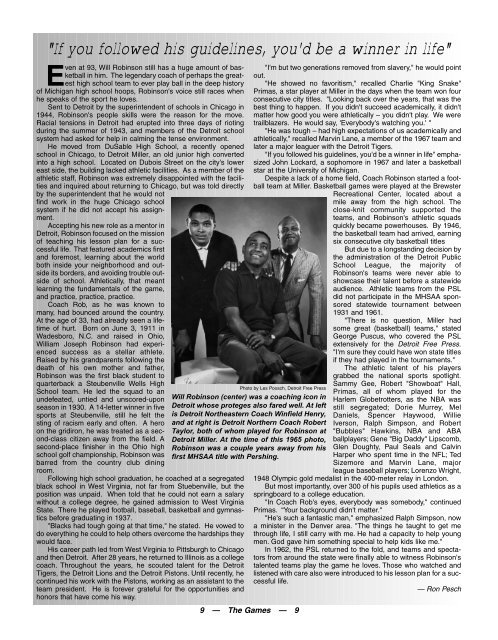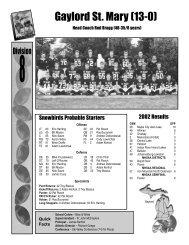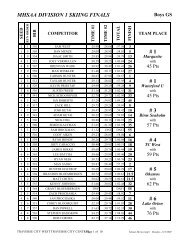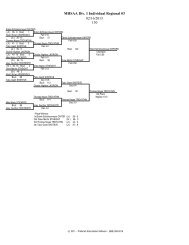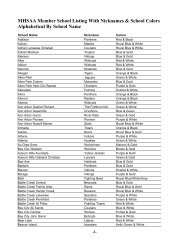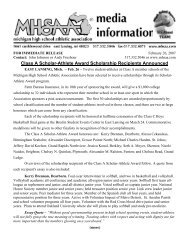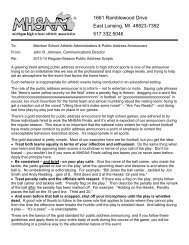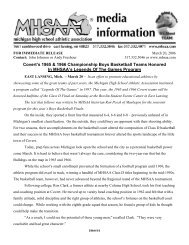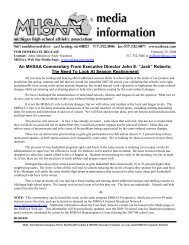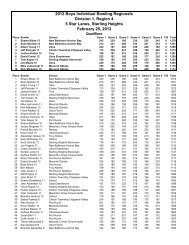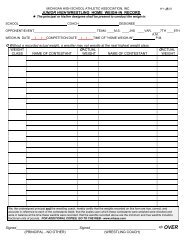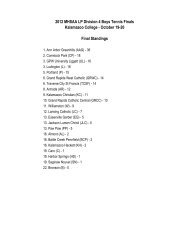Detroit Pershing - Michigan High School Athletic Association
Detroit Pershing - Michigan High School Athletic Association
Detroit Pershing - Michigan High School Athletic Association
You also want an ePaper? Increase the reach of your titles
YUMPU automatically turns print PDFs into web optimized ePapers that Google loves.
"If you followed his guidelines, you'd be a winner in life"Even at 93, Will Robinson still has a huge amount of basketballin him. The legendary coach of perhaps the greatesthigh school team to ever play ball in the deep historyof <strong>Michigan</strong> high school hoops, Robinson's voice still races whenhe speaks of the sport he loves.Sent to <strong>Detroit</strong> by the superintendent of schools in Chicago in1944, Robinson's people skills were the reason for the move.Racial tensions in <strong>Detroit</strong> had erupted into three days of riotingduring the summer of 1943, and members of the <strong>Detroit</strong> schoolsystem had asked for help in calming the tense environment.He moved from DuSable <strong>High</strong> <strong>School</strong>, a recently openedschool in Chicago, to <strong>Detroit</strong> Miller, an old junior high convertedinto a high school. Located on Dubois Street on the city's lowereast side, the building lacked athletic facilities. As a member of theathletic staff, Robinson was extremely disappointed with the facilitiesand inquired about returning to Chicago, but was told directlyby the superintendent that he would notfind work in the huge Chicago schoolsystem if he did not accept his assignment.Accepting his new role as a mentor in<strong>Detroit</strong>, Robinson focused on the missionof teaching his lesson plan for a successfullife. That featured academics firstand foremost, learning about the worldboth inside your neighborhood and outsideits borders, and avoiding trouble outsideof school. <strong>Athletic</strong>ally, that meantlearning the fundamentals of the game,and practice, practice, practice.Coach Rob, as he was known tomany, had bounced around the country.At the age of 33, had already seen a lifetimeof hurt. Born on June 3, 1911 inWadesboro, N.C. and raised in Ohio,William Joseph Robinson had experiencedsuccess as a stellar athlete.Raised by his grandparents following thedeath of his own mother and father,Robinson was the first black student toquarterback a Steubenville Wells <strong>High</strong><strong>School</strong> team. He led the squad to anundefeated, untied and unscored-uponseason in 1930. A 14-letter winner in fivesports at Steubenville, still he felt thesting of racism early and often. A heroon the gridiron, he was treated as a second-classcitizen away from the field. Asecond-place finisher in the Ohio highschool golf championship, Robinson wasbarred from the country club diningroom.Following high school graduation, he coached at a segregatedblack school in West Virginia, not far from Stuebenville, but theposition was unpaid. When told that he could not earn a salarywithout a college degree, he gained admission to West VirginiaState. There he played football, baseball, basketball and gymnasticsbefore graduating in 1937."Blacks had tough going at that time," he stated. He vowed todo everything he could to help others overcome the hardships theywould face.His career path led from West Virginia to Pittsburgh to Chicagoand then <strong>Detroit</strong>. After 28 years, he returned to Illinois as a collegecoach. Throughout the years, he scouted talent for the <strong>Detroit</strong>Tigers, the <strong>Detroit</strong> Lions and the <strong>Detroit</strong> Pistons. Until recently, hecontinued his work with the Pistons, working as an assistant to theteam president. He is forever grateful for the opportunities andhonors that have come his way.Photo by Les Poosch, <strong>Detroit</strong> Free PressWill Robinson (center) was a coaching icon in<strong>Detroit</strong> whose proteges also fared well. At leftis <strong>Detroit</strong> Northeastern Coach Winfield Henry,and at right is <strong>Detroit</strong> Northern Coach RobertTaylor, both of whom played for Robinson at<strong>Detroit</strong> Miller. At the time of this 1965 photo,Robinson was a couple years away from hisfirst MHSAA title with <strong>Pershing</strong>.9———The Games———9"I'm but two generations removed from slavery," he would pointout."He showed no favoritism," recalled Charlie "King Snake"Primas, a star player at Miller in the days when the team won fourconsecutive city titles. "Looking back over the years, that was thebest thing to happen. If you didn't succeed academically, it didn'tmatter how good you were athletically – you didn't play. We weretrailblazers. He would say, 'Everybody's watching you.' ""He was tough – had high expectations of us academically andathletically," recalled Marvin Lane, a member of the 1967 team andlater a major leaguer with the <strong>Detroit</strong> Tigers."If you followed his guidelines, you'd be a winner in life" emphasizedJohn Lockard, a sophomore in 1967 and later a basketballstar at the University of <strong>Michigan</strong>.Despite a lack of a home field, Coach Robinson started a footballteam at Miller. Basketball games were played at the BrewsterRecreational Center, located about amile away from the high school. Theclose-knit community supported theteams, and Robinson's athletic squadsquickly became powerhouses. By 1946,the basketball team had arrived, earningsix consecutive city basketball titlesBut due to a longstanding decision bythe administration of the <strong>Detroit</strong> Public<strong>School</strong> League, the majority ofRobinson's teams were never able toshowcase their talent before a statewideaudience. <strong>Athletic</strong> teams from the PSLdid not participate in the MHSAA sponsoredstatewide tournament between1931 and 1961."There is no question, Miller hadsome great (basketball) teams," statedGeorge Puscus, who covered the PSLextensively for the <strong>Detroit</strong> Free Press."I'm sure they could have won state titlesif they had played in the tournaments."The athletic talent of his playersgrabbed the national sports spotlight.Sammy Gee, Robert "Showboat" Hall,Primas, all of whom played for theHarlem Globetrotters, as the NBA wasstill segregated; Dorie Murrey, MelDaniels, Spencer Haywood, WillieIverson, Ralph Simpson, and Robert"Bubbles" Hawkins, NBA and ABAballplayers; Gene "Big Daddy" Lipscomb,Glen Doughty, Paul Seals and CalvinHarper who spent time in the NFL; TedSizemore and Marvin Lane, majorleague baseball players; Lorenzo Wright,1948 Olympic gold medalist in the 400-meter relay in London.But most importantly, over 300 of his pupils used athletics as aspringboard to a college education."In Coach Rob's eyes, everybody was somebody," continuedPrimas. “Your background didn't matter.""He's such a fantastic man," emphasized Ralph Simpson, nowa minister in the Denver area. "The things he taught to get methrough life, I still carry with me. He had a capacity to help youngmen. God gave him something special to help kids like me."In 1962, the PSL returned to the fold, and teams and spectatorsfrom around the state were finally able to witness Robinson'stalented teams play the game he loves. Those who watched andlistened with care also were introduced to his lesson plan for a successfullife.— Ron Pesch


